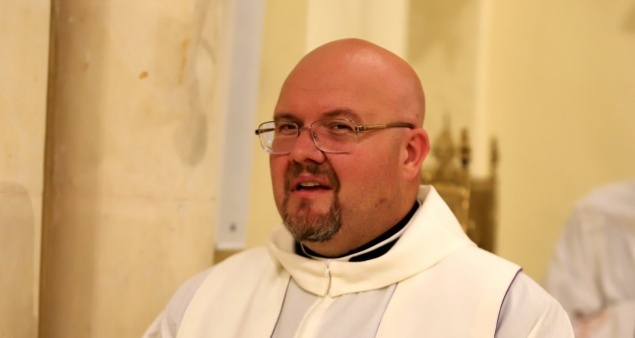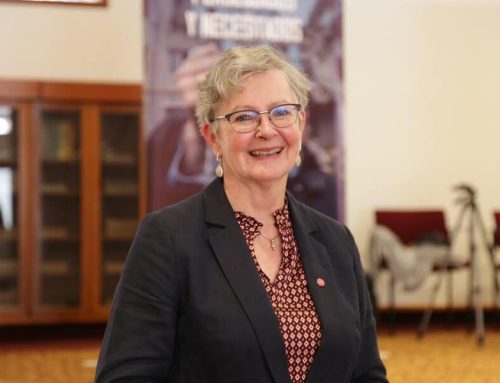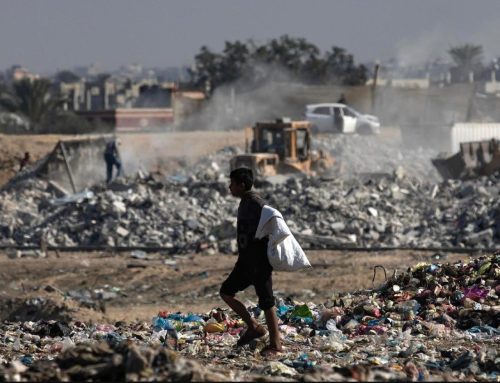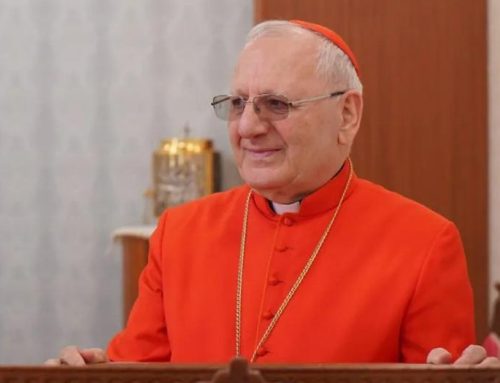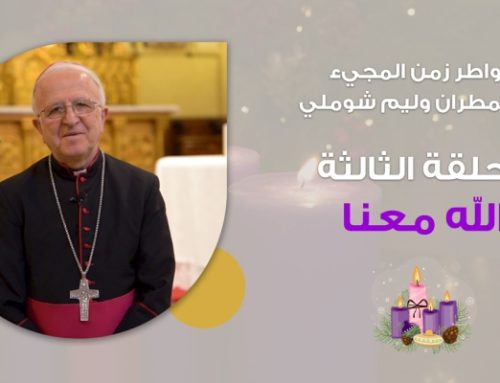INTERVIEW – After his priestly ordination in 2014, Fr. Bernard Poggi served as Chaplain to the Arab-American Catholic Community in Northern California in the United States of America for 4 years before returning to the Holy Land. Since then, he has assumed many duties at the Latin Patriarchal Seminary of Beit Jala, the last being his appointment as Rector of the seminary. In this interview, Fr. Bernard discusses the process of vocational discernment, personality traits of priests, clericalism as well as his priorities for the Seminary of the Patriarchate.
1. Since 2018, you have been serving at the Latin Patriarchal Seminary of Beit Jala. Now that you are Rector of the seminary, how do you feel about this appointment?
My appointment as the new Rector of the seminary is an opportunity for which I am most grateful to God and to His Beatitude the Patriarch. I think when I was asked to come to the seminary in 2018 I felt a great sense of responsibility. I was blessed to work under the able direction of Abouna Yacoub Rafidi, in coordination with a wonderful group of priests. I feel that, in my appointment, I am called to continue the good work which was begun in the previous years. I hope that with the grace of God things will be well in the seminary.
When I left San Francisco in 2018, I had been there for only 4 years. I asked God why my time there was so short; it was hard to leave the community which I love, the community where I grew up in – not to mention my family. But when I came back, there was great consolation in my presence with the seminarians and also in the relationships I developed with my brother priests. In that light, I rely not on my weak efforts, but on the support of the priests; those who belong to our beloved Patriarchate and more proximately those with me in the seminary: Abouna Butrus, Abouna Tony and Abouna Khaled. I cannot forget the able cooperation of all the seminarians, the sisters, the educators and staff who make the work of the seminary possible.
2. Can you talk a bit about vocation discernment at the seminary? What do seminarians need during their formation?
St. Ignatius of Loyola speaks a lot about discernment, especially that having to do with a religious vocation. He says: “our only desire and our one choice should be this: I want and I choose what better leads to God’s deepening life in me.” In being able to answer the question of how to choose what better leads to doing the will of God, we have to listen to what our heart is telling us. More than any other, Ignatius wants us to listen to what we call in normal everyday words “our feelings”. But it goes beyond just our feelings, because once you have a feeling or a desire to do something you have to ask yourself “what do I need to do to be able to reach that goal?” and secondly, “do I have the gifts and abilities to be able to follow through on the choice I am making?”
In the seminary that is our main job. We try to help young men discover if they have the gifts and abilities to reach the goal of being a priest. The first year in the major seminary (what we call the spirituality year) is dedicated to placing the seminarians before the image of a parish priest; we want them to see who he is, how he lives, how he prays, his challenges and difficulties and lastly what kind of relationship he has with his community/ parish. The second step once they understand more clearly who the parish priest is, we ask – is this what you want to become? If the seminarian can say yes to that question he continues to go through 8 more years of formation which helps to prepare him to be able to accomplish what his desire is. The question is not asked just once in those 8 years, in effect it is repeated every day. Ignatius also speaks about this when he says in the two vocations a person chooses marriage and priesthood, it is your duty to keep discerning until the day you are ordained or married. Once you are ordained or married, you stop asking the question “is this for me?”, and you begin asking “how best can I make this work?”.
But this discernment doesn’t only have to do with the seminarian himself. It also has to do with the priest formators who look for signs that help us understand if what the seminarian is saying is really there or not. While we cannot see what is on the inside of a person, we can see how he lives day in and day out – is he happy? does he deal with the communal life well? is he willing to live a life of sacrifice?, are his relationships healthy? The second thing is that through spiritual direction the seminarian begins to confide in a priest who helps him understand what is happening inside of him – his thoughts, his feelings, his emotions, his desires, his sins, his weakness, etc. These things which the seminarian must divulge freely, openly and completely, in a confidential manner, help the spiritual director understand the inner workings of the seminarian.
To answer the question of what a seminarian needs during their formation, the answer is simple – honesty and a willingness to be formed. To be honest means to open up to another who can help you understand yourself better and a willingness to be formed, means that you will accept for someone to tell you what you should and shouldn’t do, what time to wake up and sleep, what to study, where to go and lastly how to improve on the things which need improvement in you. Honesty and a willingness to be formed are the two most important things a person needs. Lastly, there needs to be an intellectual ability to learn and engage the topics which we study. Theology and Philosophy are not “easy” topics, the seminarian is one who must engage the modern world and to try to understand what is happening through the lens of faith. It is Faith Seeking Understanding to paraphrase Saint Augustine.
3. What are some common and different challenges faced by people who enter the seminary at an early age and those who join later in life?
I am always touched by the young boys who come to the seminary. Their sacrifice is very big. In today’s world, you don’t find too many people who can answer the question “what do you want to be when you grow up?” That question, which is so simple, is the beginning of leading a committed life; it seems to be getting harder and harder. Of course, the challenges of someone coming to the seminary at an early age include leaving your family to live in a place where you don’t really know anyone, where there is a disciplined manner of life. But the minor seminary is also a place of great fraternity, it instills many good things in the life of the seminarians; whether they continue on to the major seminary or they decide to leave the seminary, the formation they receive remains with them. It is so interesting to meet former seminarians who left the seminary; to see how much of an influence the seminary has left upon them.
For those seminarians who come to the seminary later in life, there is a different set of challenges that face them. The most difficult of which is classified under “not having your freedom”. It is not that you lose your freedom really, but it is that you adopt a way of life where you don’t determine the things that we usually do when we live outside. It is a different way of living, eating, praying, activity and communication. I remember when I entered the seminary, not having my car and an ability to come and go where and when I wanted was one of the biggest challenges. This is what it means when we say to give up your freedom willingly. If you think about it, every time people make a decision to go to college or get a new job there is this kind of sacrifice which you have to make. In the end, it is worth it of course and honestly, it becomes second nature – the new normal way of living; so much so that when our students go home to visit their families, after having been here for a period of time, they are happy to be back to the seminary where there really is time for everything.
Lastly, often I hear that those who come to the seminary at a later age have a “real vocation” because they give up more than those who come at an earlier age. But from experience that is not really true. A real vocation is not about what you give up, it is about what you gain. The idea as we explained earlier is to find the manner of life which brings a person into a closer union with God. This is clear in the gospel when Jesus is asked by St. Peter, his disciple: what do we get for giving everything up. Jesus is clear in his response: “no one who has left home or brothers or sisters or mother or father or children or fields for My sake and for the gospel will fail to receive a hundredfold in the present age—houses and brothers and sisters and mothers and children and fields, along with persecutions—and in the age to come, eternal life.” (Mk. 10:29)
4. How does the seminary approach introversion and extroversion when forming new seminarians? Does an introverted person, who received his vocation, have a place in religious life? Or is priesthood only reserved for extroverts?
Many think that introverts cannot become parish priests, they think more classically of them as monks, called to the silent and withdrawn life. But that is not always true. It is true that a parish priest is one who must know how to deal with people in a way that builds meaningful and lasting relationships, not just between him and the people he serves, but also between him, the community and Jesus. I think that is really what we have to focus on, more than how we can draw people to ourselves with our witty character and our outgoing personality. We have to think of the means to draw people to desire a relationship with God – to know Him, to follow Him and to love Him.
In that way, then the level to which a person is an introvert or an extrovert really depends on his ability to form relationships. One of the major things that we look for as formators is to see how well a person is able to develop and keep relationships with their peers, with the people they encounter in our parishes and also with the priests who accompany them. We notice when a person is not able to form those relationships, when they have not taken roles of leadership and we really try to help them discern if that personality trait corresponds with the diocesan priesthood. It is never a bad thing when a person discovers during formation that the diocesan priesthood is not for him. It is our duty to help a person find the place where their abilities and characteristics can be put to use for the building of the Kingdom of God. Everyone has a role in that, it is a matter of how and where.
5. Clericalism is a common problem that exists today in the Holy Land, how would you approach this issue? How important is the role of the seminary to tackle it?
Pope Francis has taken the issue of clericalism as one of the major things to which he wants to bring awareness. The major trend which is found in clericalism is the ideology that the priest knows best and that he lives a lifestyle that is not in sync with the people he serves. The Holy Father reminds priests to take on the smell of the sheep, meaning to live lives that are free from the hypocrisy of taking vow of poverty and living like a rich person. He says: “a hypocrite is afraid of the truth. It is better to pretend rather than be yourself. It is like putting makeup on the soul, like putting makeup on your behavior, putting makeup on how to proceed: this is not the truth. “No, I am afraid of proceeding like I am…,” I will make myself look good through this behavior.”
The second thing which can be a cause of clericalism in our context is that there is generally a lot of respect for people who are “religious men or men of the cloth”. We live in a context where the majority of the people belong to a religion, it is part of the culture and more than that it is necessary for a person to belong to a faith, even if they don’t believe or submit completely to it, in order for them to be able to get married, have children and even for them to be buried after their death. In this kind of society where belonging to a religion is necessary for everyday life, there is a danger where a priest can become super-powerful. Even permission to enter Israel comes through the church…This means that if a priest is not aware that these are opportunities to serve our people rather than opportunities to control them, we can misuse our power.
In order to bring awareness to this topic of clericalism and to highlight the importance of a life of service, we have chosen this year our motto from the Gospel of Matthew where Jesus tells the Disciples: “Give them yourselves something to eat” (ref. Mt. 14:16) In this discourse between Jesus and the Disciples, they want to send the crowd away because they can’t sustain their needs for food. But Jesus sees the crowd with the heart of a shepherd, He sees their hunger as His problem and He refuses the initiative of the Disciples to send the crowd away. I think this is what the Holy Father is asking us to be aware of when he says: “the seminary, he said, should not distance its students from reality, from dangers, and from others, “but, on the contrary, make you become closer to God and to your brothers.” Continuing on he says: “within the walls of the seminary, expand the boundaries of your heart — the expanded heart — extend them to the whole world,” he said, “be passionate about what ‘draws near,’ what ‘opens,’ what ‘brings together.’”
6. At present, what is your highest priority as rector?
My highest priority is, without a doubt, the seminarians. But it also means that we have to be aware of what kind of formation we offer to them and how we go about doing that. I think that in addition to working closely with the seminarians and the priests, with the sisters and staff, our priority is also to open the seminary to its surroundings while also becoming open towards others.
In addition, I think that in the past years the former rectors have done a great number of projects, and now we have a whole laundry list of things we still have to do. Before we do any more, we have to develop a 5-year and 10-year plan of action which will serve as a roadmap as to where we want to go and how to get there.
I also hope to include others in the “having a voice” in the seminary. I want other priests, laity and religious to have a say in what they want to see in the priest of tomorrow. I need the cooperation of professionals who can think with us about what it takes to provide a holistic formation experience. I am hopeful that in the coming year we will be able to get the minor seminary up and running again after its temporary closure due to coronavirus; I hope also that we will make a big effort on vocations with Abouna Khaled and other priests who are willing to help.
Lastly, I want to do something with the seminarians to help those who are less fortunate; I want to foster and nurture their devotional life and life of prayer; I want to help them love the Holy Places and to be thankful that God has called them to be priests in this Holy Land. There is a lot of work, but I know that the motto for this year is not only for the seminarians – it is for me too, to give them something to eat and to sustain their hunger and thirst to know God and to love their neighbor. Please pray for me!

